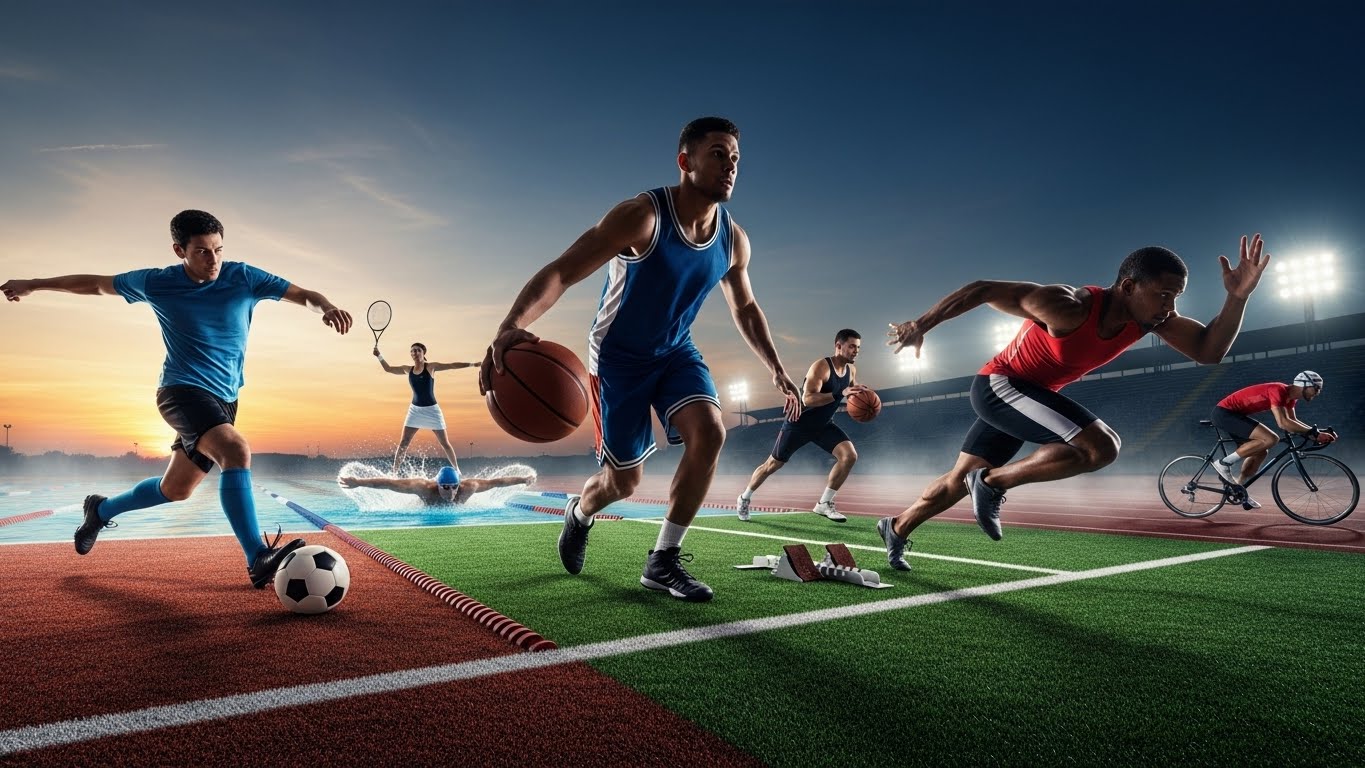Sports have been an integral part of human civilization for thousands of years. From ancient Olympic games in Greece to modern-day professional leagues across the globe, sports have transcended cultural, social, and political boundaries. The significance of sports goes beyond physical fitness; it is a powerful medium that shapes personality, teaches discipline, fosters teamwork, and provides entertainment for millions worldwide. In this blog, we will explore the various aspects of sports, its benefits, different types, and its impact on society.
The Evolution of Sports
The history of sports can be traced back to ancient civilizations, where physical activities were primarily associated with survival, military training, and religious rituals. Ancient Egyptians engaged in swimming, archery, and wrestling, while the Greeks introduced organized competitions such as the Olympic Games in 776 BC. Over time, sports evolved into structured forms with standardized rules, professional organizations, and international competitions. Today, sports are a billion-dollar industry encompassing professional leagues, international tournaments, and grassroots movements.
The evolution of sports has also been influenced by technological advancements. Modern training techniques, equipment, and facilities have enhanced athletic performance. Additionally, the rise of digital media and live broadcasting has allowed sports to reach a global audience, turning athletes into international icons.
Physical Benefits of Sports
Engaging in sports offers numerous physical benefits that are crucial for maintaining a healthy lifestyle. Regular participation in sports enhances cardiovascular health, strengthens muscles and bones, and improves flexibility and coordination. Sports like running, swimming, and cycling are excellent for improving endurance and stamina. Team sports such as football, basketball, and hockey provide an opportunity to develop agility, speed, and reflexes.
Moreover, sports help in managing body weight by burning calories and promoting metabolic efficiency. Athletes often exhibit higher levels of energy and better overall physical condition compared to non-athletes. Physical activity through sports also reduces the risk of chronic diseases such as diabetes, heart disease, and obesity, contributing to a longer and healthier life.
Mental and Emotional Benefits
Sports are not only beneficial for the body but also for the mind. Participating in sports enhances cognitive function, improves concentration, and boosts memory. Physical activity stimulates the release of endorphins, chemicals in the brain that act as natural mood elevators. This helps in reducing stress, anxiety, and depression.
Moreover, sports instill a sense of discipline and responsibility. Athletes learn to set goals, manage time, and maintain a routine. Mental toughness and resilience are developed through the challenges and setbacks encountered in sports. Learning to cope with failure, handling pressure, and maintaining composure are life skills that extend beyond the playing field.
Social Benefits of Sports
Sports play a vital role in building social connections and fostering a sense of community. Whether it is playing in a local league, attending sporting events, or following professional teams, sports create opportunities for people to interact and bond. Team sports, in particular, teach the value of collaboration, communication, and mutual respect. Athletes develop strong relationships with teammates, coaches, and competitors, promoting a sense of camaraderie and belonging.
Furthermore, sports serve as a platform for promoting cultural exchange and understanding. International events like the Olympics, FIFA World Cup, and ICC Cricket World Cup bring together athletes and fans from diverse backgrounds, promoting unity and mutual respect among nations.
Life Lessons Learned from Sports
Sports are often referred to as a microcosm of life, offering lessons that extend far beyond the playing field. Discipline, perseverance, and hard work are core values instilled through regular participation in sports. Athletes learn to set realistic goals, stay motivated, and overcome obstacles. These lessons are transferable to education, career, and personal relationships.
Sports also teach the importance of teamwork and leadership. Understanding the strengths and weaknesses of team members, making collective decisions, and supporting each other are essential skills for success in both sports and life. Additionally, sports encourage ethical behavior, fair play, and respect for rules and opponents, which are critical aspects of personal integrity.
Popular Types of Sports
Sports can be broadly categorized into individual and team sports, each offering unique benefits and experiences.
Individual Sports
Individual sports focus on personal performance, self-discipline, and skill development. Common individual sports include athletics, swimming, gymnastics, tennis, and martial arts. These sports allow athletes to set personal goals, monitor progress, and achieve self-mastery. Individual sports foster independence, self-confidence, and mental fortitude, as success largely depends on personal effort and determination.
Team Sports
Team sports involve collaboration, strategy, and coordination among players. Popular team sports include football, basketball, volleyball, hockey, and cricket. Team sports emphasize communication, trust, and mutual support, teaching athletes how to work collectively towards a shared goal. Team sports also promote healthy competition, as players learn to balance personal ambitions with team objectives.
Adventure and Extreme Sports
Adventure sports, also known as extreme sports, include activities like rock climbing, surfing, skiing, skydiving, and paragliding. These sports provide thrill, excitement, and adrenaline rushes, challenging individuals to push their physical and mental limits. Adventure sports often require courage, quick decision-making, and risk management, helping athletes build resilience and confidence.
Recreational and Indoor Sports
Recreational and indoor sports, such as table tennis, badminton, yoga, and bowling, are suitable for all age groups and fitness levels. These sports are often played for leisure, relaxation, and social interaction. Recreational sports encourage physical activity without the pressure of competition, making them an accessible option for maintaining a healthy lifestyle.
Sports and Education
The integration of sports into education is essential for holistic development. Schools and colleges worldwide recognize the importance of physical education and sports programs in shaping well-rounded individuals. Participation in sports enhances academic performance by improving concentration, memory, and cognitive function. Moreover, students involved in sports exhibit better discipline, time management, and leadership skills.
Sports scholarships and professional training programs provide opportunities for talented athletes to pursue higher education while nurturing their athletic abilities. This balance between academics and sports prepares students for future challenges, instilling a sense of responsibility and ambition.
The Role of Technology in Modern Sports
Technology has revolutionized the world of sports, enhancing performance, safety, and fan engagement. Advanced training equipment, wearable devices, and performance analytics enable athletes to monitor and improve their skills with precision. Video analysis, motion tracking, and biomechanical assessments help in identifying strengths, weaknesses, and areas for improvement.
Technology has also transformed the way fans experience sports. Live broadcasts, virtual reality, and interactive platforms allow audiences to follow their favorite teams and athletes in real-time. Social media provides a space for fans to engage, share opinions, and celebrate sporting achievements, fostering a global sports community.
The Economic Impact of Sports
Sports have a significant economic impact, generating revenue through ticket sales, merchandise, sponsorships, and broadcasting rights. Major sporting events create employment opportunities, boost tourism, and stimulate local businesses. Professional leagues and clubs invest in infrastructure, training facilities, and community programs, contributing to overall economic growth.
The sports industry also encourages entrepreneurship and innovation, with businesses developing sports equipment, fitness apps, nutrition products, and sportswear. This economic ecosystem highlights the multifaceted role of sports beyond physical activity, emphasizing its contribution to societal development.
Sports and Cultural Significance
Sports hold immense cultural significance, reflecting societal values, traditions, and identities. Different regions and countries have unique sporting preferences, often linked to history, geography, and lifestyle. For instance, cricket is deeply embedded in South Asian culture, while football dominates European and Latin American communities. Traditional sports and games, such as kabaddi, sumo wrestling, and lacrosse, preserve cultural heritage and foster community pride.
Moreover, sports have been a platform for social change and activism. Athletes often use their influence to raise awareness about social issues, promote equality, and inspire positive change. From breaking racial barriers to advocating for gender equality, sports have played a pivotal role in shaping progressive societies.
The Future of Sports
The future of sports is poised for exciting developments, driven by innovation, globalization, and changing societal trends. Emerging sports, virtual competitions, and e-sports are gaining popularity, attracting a new generation of enthusiasts. Inclusive sports initiatives are promoting participation among individuals with disabilities, ensuring that sports remain accessible and equitable.
Sustainability is becoming a key focus, with efforts to reduce the environmental impact of sporting events and infrastructure. The integration of technology, data analytics, and artificial intelligence will continue to enhance athlete performance, fan engagement, and operational efficiency.
Sports will remain a universal language, connecting people across borders and generations. Its ability to inspire, educate, and entertain ensures that it will continue to play a vital role in shaping human experiences.
Conclusion
Sports are much more than games; they are a reflection of human spirit, resilience, and creativity. They contribute to physical health, mental well-being, social cohesion, and personal growth. From the excitement of competitive matches to the joy of recreational activities, sports offer a wealth of benefits that enrich our lives. By embracing sports in everyday life, individuals can cultivate discipline, build strong relationships, and experience the thrill of achievement. Ultimately, sports serve as a powerful reminder of the importance of effort, teamwork, and perseverance, inspiring people to reach their full potential both on and off the field.


